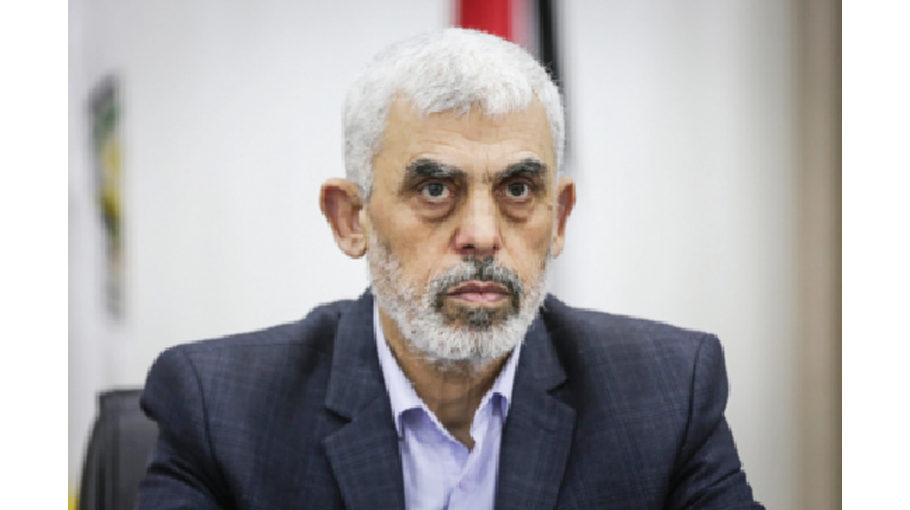Hamas leader Yahya Sinwar ‘killed’ in surprise encounter with Israeli forces

Yahya Sinwar, the Hamas leader who masterminded the 7 October attack on Israel that triggered the war in Gaza, has been killed in an unexpected encounter with Israeli ground forces, according to several initial reports.
The Israel Defense Forces said it was checking whether Sinwar was one of three militants killed during an operation but that their identities could not yet be confirmed.
Several security officials, speaking anonymously to Israeli media, said the bodies had been taken to Israel for DNA tests, and that the IDF assesses “with high probability” that one of those killed was Sinwar.
Israel’s Kan Radio reported that the Hamas leader had been killed “by chance”, and not as a result of intelligence gathering. The station also said the bodies were found with lots of cash and fake IDs.
Graphic photos and video from the scene, broadcast on Israeli media, showed what appeared to be Sinwar’s body, wearing fatigues, with a severe head injury, lying on a pile of rubble on the floor of a destroyed building. It was not immediately clear when or where the footage was taken, or how the damage was caused.
There was no immediate comment from Hamas.
Israel’s Channel 12 reported that an infantry battalion, operating with a tank unit, identified a group of men running into a building. The forces opened fire using tank shells, and the bodies were buried under the rubble.
If confirmed, the death of Sinwar would represent a major boost to the Israeli military and the Israeli prime minister, Benjamin Netanyahu, after a string of high-profile assassinations of prominent leaders of its enemies in recent months.
It has long been believed that Sinwar had surrounded himself with Israeli hostages to lessen the likelihood of being killed. However, in a statement, the prime minister’s office said that no hostages were believed to have been present.
Israel has spared no resources in its year-long hunt for Sinwar, engaging a taskforce of intelligence officers, special operation units, military engineers and surveillance experts under the umbrella of the Israeli Security Agency. Yet, in the end, he appears to have been killed by regular troops on patrol.
Sinwar considers himself an expert on Israel’s military and politics. He speaks perfect Hebrew, learned during more than 20 years in prison, and was the driving force behind Hamas’s strategy of the last few years: to lull Israel into thinking the group had been deterred from fighting Israel, before launching the surprise attack in which 1,200 people were killed and another 250 taken hostage.
Various western and Israeli intelligence assessments over the past year suggested that Sinwar has long shunned electronic communication, relying on a network of couriers to communicate with the outside world from Hamas’s vast network of tunnels beneath the Gaza Strip.
Those reports also said Sinwar had become “fatalistic” over a year of intense warfare in which 42,000 people have been killed, believing he would die, but still hoping to ensnare Israel in a regional battle with Iran and allied groups around the Middle East such as Lebanon’s Hezbollah.
Sinwar, 61, was born in the Khan Younis refugee camp in southern Gaza and grew up in poverty before studying at the Islamic University of Gaza, where he received a bachelor’s degree in Arabic Studies.
Among his childhood friends were Mohammed Deif, Hamas’s military chief, whom Israel claimed to have killed in an airstrike three months ago, and Mohammed Dahlan, an influential member of the secular Fatah party now living in exile in the UAE.
He joined Hamas at an early age, soon after the group’s founding, spending much of his youth in and out of Israeli prison. He rose through the ranks as an infamous enforcer, in charge of finding and killing suspected Palestinian collaborators with Israel, and was instrumental in building the group’s military capabilities.
In 1989, he was sentenced to four life sentences for the abduction and killing of two Israeli soldiers and four Palestinians he suspected of collaboration. He served 22 years, becoming a respected prison leader, before he was released in the 2011 prisoner exchange in which Israeli soldier Gilad Shalit was returned for 1,000 Palestinians. He married on his return to Gaza, and had three children.
Sinwar was elected by other Hamas members in a secret ballot as Hamas’s chief in Gaza in 2017, surviving several Israeli assassination attempts. Unlike some senior Hamas leaders, he has never wavered from a belief that armed struggle is the only way to force the creation of a Palestinian state.
In a sign of the group’s hardening position on ceasefire talks, Sinwar was appointed as head of the group overall after Israel’s assassination of Hamas’s Qatar-based political chief, Ismail Haniyeh, in July.
Israel said it came close to capturing or killing Sinwar in January, when it found DNA evidence of his presence in a bunker beneath Khan Younis, including clothing and more than 1m shekels (more than £200,000) in wads of banknotes. He was estimated to have left a few days before Israeli forces raided the bunker.
In a statement, Israel’s Hostage Families Forum said: “The Forum commends the security forces for eliminating Sinwar, who masterminded the greatest massacre our country has ever faced, responsible for the murder of thousands and the abduction of hundred
“However, we express deep concern for the fate of the 101 men, women, elderly and children still held captive by Hamas. We call on the Israeli government, world leaders, and mediating countries to leverage the military achievement into a diplomatic one.



